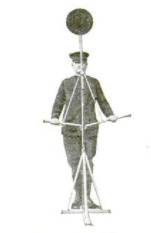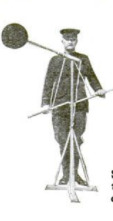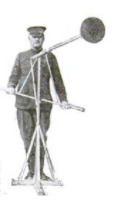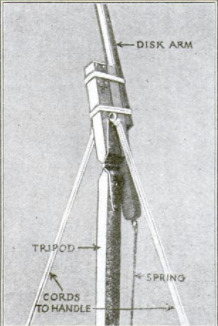A new method designed to send visual messages using signals activated by a machine
Item
-
Title (Dublin Core)
-
A new method designed to send visual messages using signals activated by a machine
-
Article Title and/or Image Caption (Dublin Core)
-
Wigwagging Is Now Done by Machine
-
extracted text (Extract Text)
-
IN the signal serv-
ice of the Amer-
ican army the Am-
erican Morse code
is used, and for
short distances the
signals are given
by two flags oper-
ated by hand. Sem-
aphore signals, as
these flag signals
are officially called,
are used when telegraph, telephone,
or wireless lines are not available.
‘The reasons are obvious. Even in good |
light and a clear atmosphere, flag
signals cannot be
read distinctly be-
yond a distance of
2,000 feet. Haze or
fog will obscure
them even at short-
er range. More
over, semaphore sig-
nals are slow. To
‘manipulate two flags
rapidly requires
considerable effort
and is extremely
tiresome.
Lieutenant-Colonel B. O. Lenoir,
of the U. S. A. Signal Corps, overcomes
these disadvantages by signaling with
disks. He uses a single disk in place
of the two flags, and signals the dots
or dashes by swinging the disk to one
side or the other. The disks consist
of wire hoops covered on one side with
black and on the other with white
cloth. The size depends upon the dis-
tance to which the signals are to be sent.
The disk, which is attached rigidly
to a light rod about thirty inches long,
may be operated by hand or, more effi-
ciently, by a device designed by Lieu-
tenant-Colonel Lenoir. To the top of a
suostantial upright
post, braced by a
sort of tripod, is
hinged the rod with
the disk, so that it
may be swung in a
vertical plane at a
right angle to the
line of vision. The
disk is tilted by
two cords at-
tached to hinged
tillers moved by
hand.
-
Language (Dublin Core)
-
eng
-
Date Issued (Dublin Core)
-
1919-02
-
pages (Bibliographic Ontology)
-
82
-
Rights (Dublin Core)
-
Public domain (Google digitized)
-
Archived by (Dublin Core)
-
Davide Donà
-
Marco Bortolami (editor)
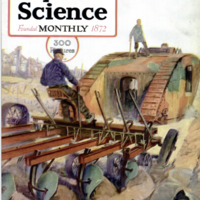 Popular Science Monthly, v. 94, n. 2, 1919
Popular Science Monthly, v. 94, n. 2, 1919

